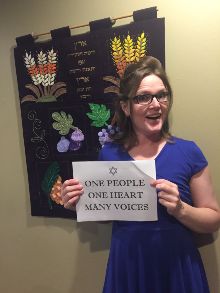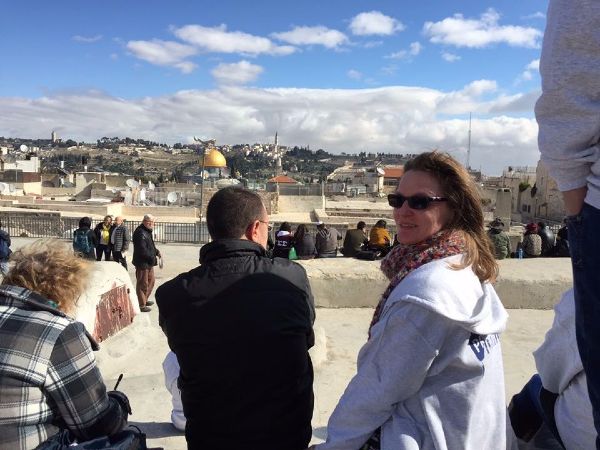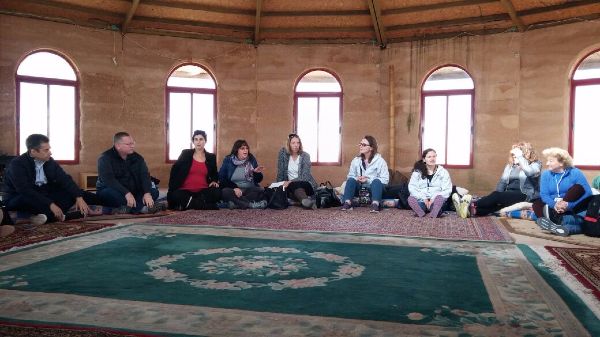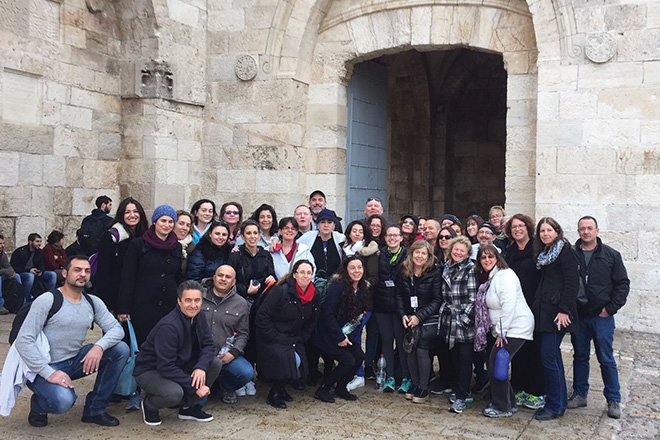Article by Julia Malaga, Golda Och Academy
Feature image: American and Israeli Peoplehood Project cohorts in the Old City of Jerusalem, January 2017.
My husband is Jewish and we raised our children in the Jewish religion, but until five years ago, I considered myself on the periphery of the Jewish community. I had been married for more than 20 years and never considered converting, despite having worked in Golda Och Academy, a Jewish school, since 2005.

In December 2012, GOA sent a group of faculty and staff to Israel, in a trip that mirrored the capstone trip that the school’s 12th-graders take. When I returned, I covered my school office in oversized photos of our travels and hung an Israeli flag on my door. The trip inspired me to expand my learning in Jewish studies — it became clear that this was something I needed to do for myself and my family.
At first I embarked on my own, reading blogs and listening to podcasts. The website “My Jewish Learning” and the podcasts on JCast Network remain favorites today. By October 2014, I had decided to convert and began the process with the assistance of my then head of school, Rabbi Joyce Raynor. In addition to my formal weekly learning, I spent at least two hours every day learning about Jewish history, religion and culture. Most of that time was in the car, listening to podcasts during my 90-minute roundtrip commute, but I also read during lunch on weekdays and over the weekends.
I officially converted to Judaism in June of 2015. Conversion wasn’t the end point of my learning, though — it was the beginning. A vow that I took during the conversion was that my destiny would be forever bound with the Jewish people. In order to fulfill that, I became more involved in the Jewish philanthropic community.
In the spring of 2016, I participated in the Arthur Borinsky Leadership Program. Sponsored by the Jewish Federation, a philanthropic organization that spans five counties in northern New Jersey, the program aims to tap future lay leaders. We learned about different Jewish organizations, initiatives, agencies and fundraising, meeting for three hours every Wednesday for seven weeks.

An organizer of the Borinsky program nominated me to participate in another Jewish Federation program called the Peoplehood Project, a two-year project that began in September 2016. We 18 participants meet once a month for Jewish learning and leadership training, perhaps most importantly to build bridges with Jewish communities abroad. Last January, we spent seven days in Israel, staying in the homes of our partner Israeli cohort in the Negev desert. In an Amazing Race-type activity, we visited agencies and projects that the Jewish Federation helps fund, including a school, senior center, community art studio, moshav (cooperative community of small farms) and center for at-risk youth. We attended a security briefing with police and learned about rocket attacks from Gaza. We traveled to a kibbutz (communal settlement or farm), and visited a school where Arab and Jewish children learn together with hopes of building a stronger shared society. We went to Jerusalem to learn about religious pluralism, and we participated in a spiritual retreat in the desert.

Then in April, the Israeli group came to New Jersey and stayed with our families while they learned about religious pluralism in the U.S. Many Israeli Jews perceive orthodoxy and secularism as the only options. We showed them the spectrum of choices we have outside of Israel. They visited different types of synagogues and heard a number of speakers. We also built friendships through social activities, like attending a Broadway show and line-dancing at a country-western bar.
Next year, in April, our combined American/Israeli group will travel to Cherkassy, Ukraine, to visit a vulnerable Jewish community impacted by poverty and civil and political unrest. We’ll visit the projects the Federation funds there, including a summer camp and orphanage, while learning more about a third Jewish community. Our final leg will be a return trip to Israel for its 70th birthday in May 2018.
My continuing studies have enhanced my ability to support the school's mission — I have a common language when speaking with our families and am able to better express our mission in our fundraising efforts.
I’m already looking for my next endeavor to follow the Peoplehood Project, and in the meantime, I’ve started learning Hebrew. It’s an immense challenge as an adult, as you have to learn not only a new alphabet, but how to read “backwards.” I can only do it for about 15 minutes at a time, but I am motivated to do a little each day. Some of our Israeli counterparts in Peoplehood don’t speak English well, and learning Hebrew will help me communicate better with them.
Even before that first trip to Israel, my experience working at Golda Och planted the seeds for my passion for Jewish learning. The school is a community with a deep commitment to formal and experiential Jewish education. In turn, my continuing studies have enhanced my ability to support the school's mission — I have a common language when speaking with our families and am able to better express our mission in our fundraising efforts. I may not have a shared history, but I now share knowledge and experiences.




